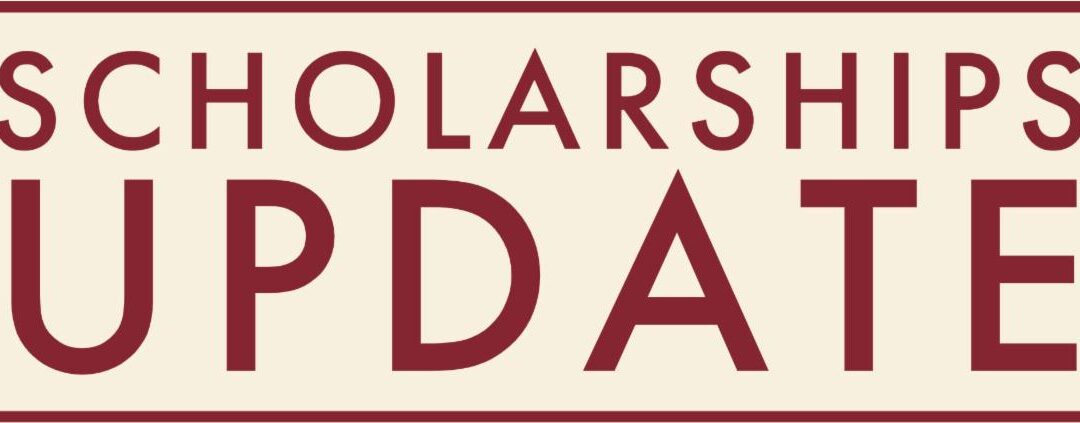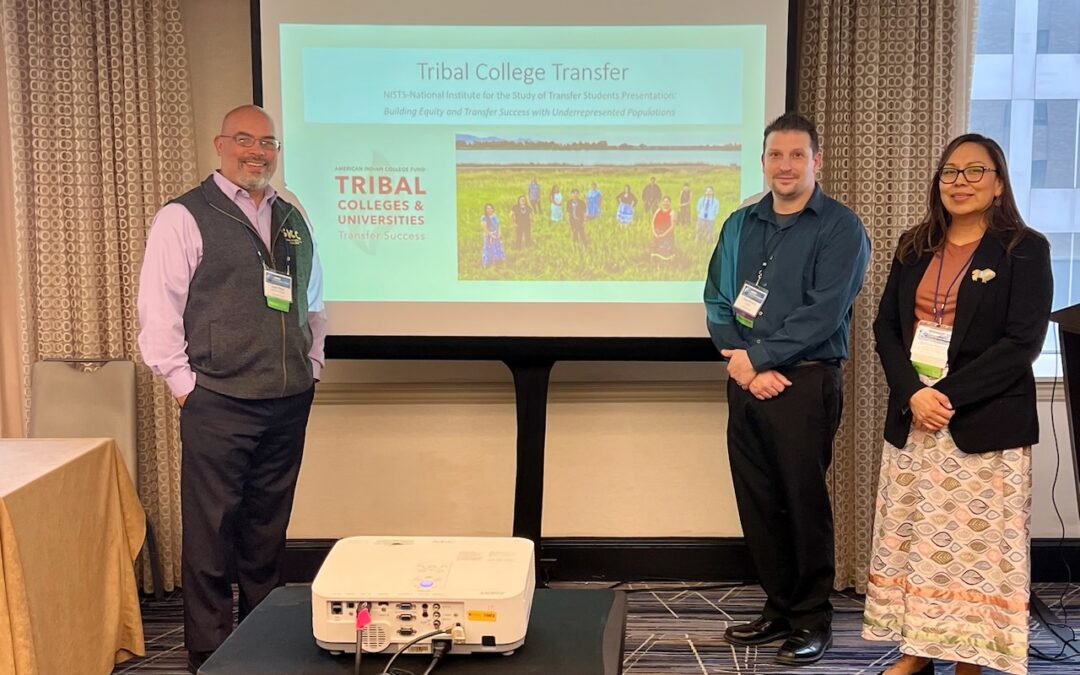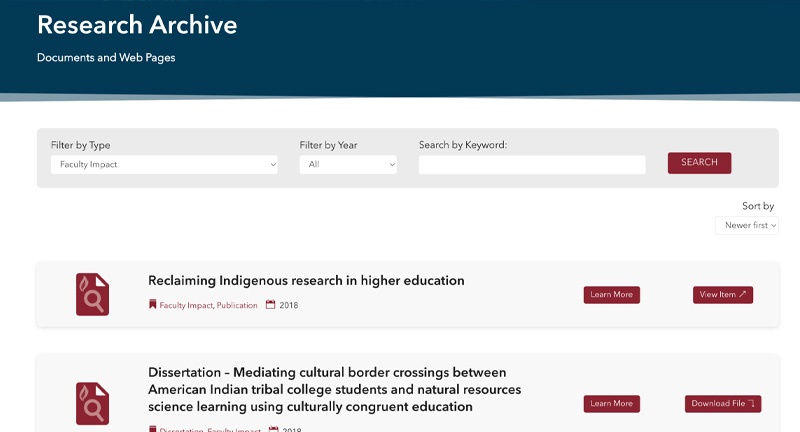American Indian College Fund Announces Tribal College Faculty Fellows Pursuing Masters and Terminal Degrees
Fellowships Develop Faculty Teaching and Research Expertise
Denver, Colo.—April 11, 2023–The American Indian College Fund (College Fund) is supporting 28 tribal college and university (TCU) faculty and staff pursuing master or doctoral degrees with grants totaling $406,975. Funding from several fellowship programs helps build greater educational expertise in Indian Country and the academic capacity of the 35 TCUs the College Fund supports.
The fall 2022 cohort includes the following faculty fellows for each specific fellowship:
The Mellon Master’s Fellowship was established in 2014 by the College Fund and the Andrew W. Mellon Foundation to increase and retain the number of faculty members with a master’s degree in the humanities and humanistic social sciences at the 35 accredited TCUs. The fellowship provides current TCU faculty and staff who are likely to become faculty with support and resources to complete a master’s degree in two years. Fellows include:
- Leah Mata-Fragua (yak titʸu titʸu (ytt) Northern Chumash), adjunct professor of Indigenous liberal studies at the Institute of American Indian Arts, M.F.A. in studio arts.
- Margarita Paz-Pedro (Pueblo of Laguna), studio arts adjunct professor at the Institute of American Indian Arts, M.F.A. in studio arts.
- Melanie Sandoval (Salish and Navajo), language instructor at Salish Kootenai College, M.A. in linguistics.
The College Fund Master’s Fellowship and Doctorate Fellowship Programs were established in 2021 to support faculty pursuing a graduate degree. By promoting graduate and terminal degrees among faculty, the College Fund helps develop skilled leaders who have already demonstrated their commitment to TCUs. Fellowships are open to faculty pursuing degrees in any field of study.
The College Fund Doctorate Fellowship is awarded to faculty who have completed their doctoral coursework, entered the dissertation phase, and will complete their degree within one year. Fellowship awards are up to $20,000. Fellows include:
- Kayla Alkire-Stewart (Standing Rock Sioux Tribe), Monarch Project Director at United Tribes Technical College and adjunct professor at Sitting Bull College, Ed.D. in higher education leadership.
- Mary Bordeaux (Sicangu/Oglala Lakota), assistant professor of museum studies at the Institute of American Indian Arts, Ed.D. in leadership.
- Jessica Burghart (Prairie Band Potawatomi), business faculty at Haskell Indian Nations University, Ph.D. in philosophy of management.
- Karen Colbert, chair of the general education department and lead math faculty at Keweenaw Bay Ojibwa Community College, Ph.D. in computational science and engineering.
- Merisa Jones (Lummi Nation), instructor of Native studies leadership at Northwest Indian College, Ed.D. in education leadership.
- Danny Luecke (Choctaw Nation of Oklahoma), math faculty at Turtle Mountain Community College, Ph.D. in math and math education.
- Tami Niswander, chief financial officer and adjunct instructor at Red Lake Nation College, doctorate of business administration (D.B.A.).
- Ryan O’Leary (Bois Forte Band of Ojibwe), business instructor at Leech Lake Tribal College, Ph.D. in global leadership.
- Beth Paap (Red Cliff Band of Lake Superior Chippewa), adjunct English instructor at Lac Courte Oreilles Ojibwe University, Ed.D. in education.
- Tiffany Pinckney, chair and professor of human and social services department at United Tribes Technical College, doctorate in social work (D.S.W.).
- Nonabah Sam (Diné), adjunct instructor and museum curator at Diné College, Ed.D. in educational leadership.
- Monte Schaff, institutional research analyst and adjunct faculty at United Tribes Technical College, Ph.D. in general psychology.
The College Fund Master’s Fellowship is awarded to faculty who have been accepted to or are enrolled in a master’s program. The award is up to $25,000 for up to two years. Fellows include:
- Ashley Hebert, chair and faculty member of the early childhood education department at Keweenaw Bay Ojibwa Community College, M.A. in early childhood education.
- Naomi Billedeaux-Holcomb (Confederated Salish and Kootenai Tribes), Salish language instructor at Salish Kootenai College, M.Ed. curriculum and instruction.
- Neilroy Singer (Diné), adjunct instructor and environmental research specialist at Diné College, M.S. in biology.
- Tina Tourtillott (Menominee Indian Tribe of Wisconsin), business faculty at Haskell Indian Nations University, M.B.A. in Native American leadership.
- Joan Kruzich (Ojibwa descendant), adjunct business instructor at Keweenaw Bay Ojibwa Community College, M.B.A.
The Nyswander-Manson Pre-Dissertation Fellowship is awarded to faculty at four-year TCUs pursuing a doctoral degree. Fellows include:
- Kim Parko, chair and professor of creative writing at the Institute of American Indian Arts, Ph.D. in visionary practice and regenerative leadership.
- Jennifer Rodin, math faculty at Sinte Gleska University, Ph.D. in curriculum and instruction.
- Ryan Winn, liberal studies faculty at the College of Menominee Nation, Ph.D. in Indigenous literature and cultural theory.
The Blanchard Pre-Dissertation Fellowship supports faculty at two- and four- year TCUs pursuing a doctoral degree. Fellows include:
- Sarah Vande Corput, letters and science faculty at the College of Menominee Nation, Ed.D. in higher education and leadership.
- Kayla Diamond, TRIO/SSS academic coach and adjunct instructor at the College of Menominee Nation, Ed.D. in higher education administration.
- Shaina Nez (Diné), senior lecturer in creative writing and English at Diné College, Ph.D. in justice studies.
- Heather Stelzer, early childhood education faculty and assistant department chair at Bay Mills Community College, Ph.D. in education and human development.
- Nadine Lisa Whitecloud (Sioux Valley Dakota Nation), outreach coordinator and adjunct instructor at Lac Courte Oreilles Ojibwe University, Ed.D. in First Nations education.
About the American Indian College Fund—The American Indian College Fund has been the nation’s largest charity supporting Native higher education for 33 years. The College Fund believes “Education is the answer” and provided $14.45 million in scholarships and other direct student support to American Indian students in 2021-22. Since its founding in 1989 the College Fund has provided more than $284 million in scholarships, programs, community, and tribal college support. The College Fund also supports a variety of academic and support programs at the nation’s 35 accredited tribal colleges and universities, which are located on or near Indian reservations, ensuring students have the tools to graduate and succeed in their careers. The College Fund consistently receives top ratings from independent charity evaluators and is one of the nation’s top 100 charities named to the Better Business Bureau’s Wise Giving Alliance. For more information about the American Indian College Fund, please visit www.collegefund.org.
Journalists: The American Indian College Fund does not use the acronym AICF. On second reference, please use the College Fund.










